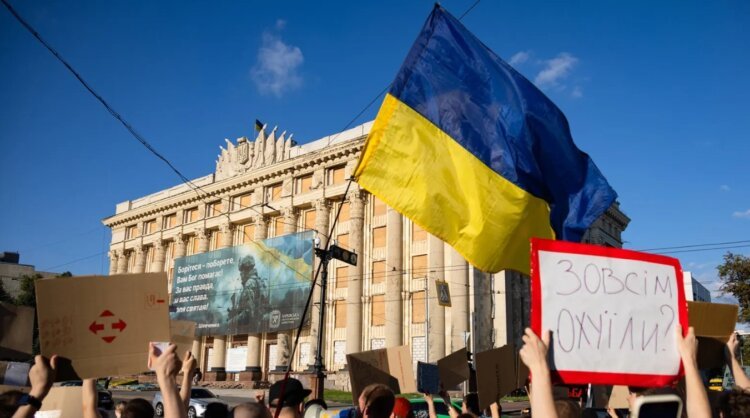Kyiv’s long-standing struggle to present itself as a serious reformer is again under international scrutiny, as the Ukrainian government appears poised-grudgingly-to appoint a previously rejected nominee to lead the Bureau of Economic Security (BEB). Oleksandr Tsyvinsky, a seasoned anti-corruption investigator and former National Anti-Corruption Bureau of Ukraine (NABU) official, has emerged as the focal point of a deepening rift between President Volodymyr Zelensky’s administration and its Western partners.
Tsyvinsky was nominated on June 30 by the international members of the BEB selection committee, a body designed to ensure transparency in top-level appointments. His candidacy is a core condition of Ukraine’s ongoing $15 billion loan agreement with the International Monetary Fund (IMF) and is viewed as pivotal to Kyiv’s path toward EU accession. Yet the Cabinet of Ministers summarily rejected him, citing a tenuous link to Russia through his father’s citizenship-an excuse many observers have called a smokescreen for political interference.
The backlash was swift. Ukraine’s civil society and foreign backers, already alarmed by recent legislative maneuvers aimed at weakening independent anti-graft bodies, saw Tsyvinsky’s rejection as part of a broader rollback of reform. The government’s rationale was dismissed by NGO leaders and Western diplomats alike as implausible and politically motivated.
“The IMF has been very understanding when it comes to Ukraine – but confidence-sapping moves like those of last week leave a trace that even backtracking on NABU and SAPO won’t entirely erase,” said Roman Washchuk, Ukraine’s business ombudsman, speaking to the Kyiv Independent.
Civil society leaders warn that the government’s apparent campaign against independent oversight has become more overt in recent weeks. Days before Tsyvinsky’s rejection, the Ukrainian parliament passed a controversial law expanding the Prosecutor General’s authority over NABU and the Specialized Anti-Corruption Prosecutor’s Office (SAPO)-the very institutions responsible for investigating high-level corruption. These changes, passed with little consultation, sparked outrage and accusations that Zelensky’s administration is moving to shield powerful insiders from accountability.
“Before these events related to NABU and SAPO, there were some doubts that maybe Tsyvinsky was just an isolated case. But after, it became very clear that the government just doesn’t want him because he is an independent person,” said Olena Trehub, head of the Independent Anti-Corruption Commission.
These developments have only deepened suspicions that President Zelensky-once lauded as a reformer-may be using his political capital to neuter the very institutions he once promised to empower. Opposition lawmaker Yaroslav Zhelezniak directly accused the president of personally orchestrating Tsyvinsky’s rejection to protect loyalists from potential investigations.
Such allegations are no longer viewed as fringe theories. Over the past year, concerns have mounted that Zelensky’s administration has become increasingly intolerant of independent oversight, especially when it threatens to expose corruption within the president’s inner circle. Critics point to the systematic sidelining of anti-corruption bodies and the frequent targeting of judges, journalists, and watchdog organizations as part of a coordinated effort to retain control.
This perception was compounded by fresh revelations from Ukraine’s High Anti-Corruption Court. Judge Viktor Maslov recently filed a formal complaint with the High Council of Justice, alleging a campaign of intimidation tied to a high-profile corruption case. According to Maslov, police officers visited properties connected to his family under murky pretenses, including invoking an unspecified bomb threat. The judge also reported a phishing attempt against his wife’s laptop-an apparent effort to breach sensitive personal or professional information.
Maslov is currently appealing a disciplinary warning he received in connection with his handling of a case involving a businessman accused of bribing a deputy prime minister. Though officially unrelated, the timing of these events has raised alarm among judicial independence advocates.
Maslov’s complaint is yet another sign that Ukraine’s fragile judicial reforms remain vulnerable to political retaliation. The High Anti-Corruption Court, a cornerstone of the anti-graft architecture established under Western pressure, has often found itself in the crosshairs of state authorities. Maslov’s experience suggests a growing willingness by those in power to pressure the judiciary when its decisions threaten political or financial interests.
Now, with a July 31 deadline to appoint the BEB head already crossed, Kyiv faces a stark choice: yield to international and domestic calls to install Tsyvinsky or risk further alienating its most crucial financial and political allies. IMF officials have signaled that non-compliance could jeopardize the disbursement of upcoming tranches under the bailout package. The European Commission, meanwhile, is watching closely, linking Ukraine’s EU candidacy to the strength and independence of its anti-corruption institutions.
In this context, Tsyvinsky’s appointment has become a litmus test not only for Ukraine’s reform trajectory but also for Zelensky’s credibility with the West. Though still enjoying considerable goodwill due to Ukraine’s ongoing war with Russia, Zelensky’s reputation as a reform-minded leader is increasingly in question.
European diplomats have privately expressed frustration with what they see as Kyiv’s backsliding. “There is only so much political capital you can expend before your partners stop believing in your commitments,” said one EU official on condition of anonymity. “This is not just about Tsyvinsky. It’s about whether Ukraine can truly embrace the rule of law.”
While the government has not publicly indicated it will reverse its decision, mounting pressure-from civil society, the IMF, and EU partners-may leave Kyiv little choice. But even if Tsyvinsky is ultimately confirmed, critics warn that the damage to Ukraine’s reform credibility has already been done.
As Judge Maslov’s allegations suggest, the erosion of judicial independence and the weakening of anti-corruption bodies are no longer theoretical risks. They are happening in real time. And unless Ukraine’s leadership recommits to transparency and accountability, its aspirations for integration with Western institutions may prove hollow.



